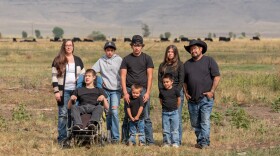-
The midterms are a year away, but the money races are already going strong, as each party eyes control of Congress.
-
Rural electric co-ops on the Western Slope and the Four Corners region are partnering with bigger utilities on renewable energy, even as the Trump administration signals its preference for fossil fuels.
-
With election day less than a month away, the Boulder County Clerk and Recorder held a voter drive at All Roads shelter. The goal was to assist county residents who are in housing transition or are unhoused.
-
Colorado's prisons are understaffed and overcrowded, pushing inmates into county jails. The state's emergency plan is now active, but local leaders say it's only a temporary fix.
-
A new investigation from KFF Health News shows 38 cases between 2022 and 2024 where employers withheld wages in Garfield County because of an employee's unpaid medical bills, some of which were covered by Medicaid.
-
-
The Snowmass Balloon Festival celebrated 50 years in September. Weather conditions and fire restrictions grounded balloons for the first two days of the festival, but balloons were eventually able to fly.
-
Denver Water's 'From Forests to Faucets' program partners with state and federal partners to manage forests in fire-vulnerable parts of the utility's watershed.
-
Pitkin County Sheriff Michael Buglione told reporters Wednesday that Anita Thompson, Hunter S. Thompson's widow, had concerns this year surrounding her late husband's death. Together, they met with the Colorado Bureau of Investigation, and she later requested an independent review of the original investigation.
-
It wasn’t a typical fall day at one of the most popular national parks in the country. The night before, the federal government shut down, leaving fewer workers on the job. Yet the Trump Administration decided that national parks should largely remain open, nonetheless.

Play Live Radio
Next Up:
0:00
0:00
Available On Air Stations










